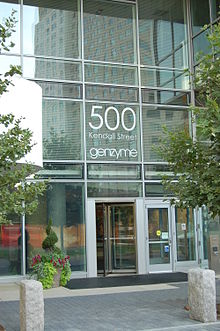Genzyme Corporation
|
Sanofi Genzyme headquarters in Cambridge, MA
|
|
 |
|
| Fully Owned Subsidiary | |
| Industry | Biotechnology |
| Founded | Boston, Massachusetts (1981) |
| Headquarters | Cambridge, Massachusetts, United States |
|
Key people
|
David Meeker, MD |
| Products |
Cerezyme Fabrazyme Synvisc Renagel More Complete Product List |
| Revenue | US $4.61 billion (2007 calendar) |
|
|
|
|
|
|
|
Number of employees
|
12,000 (2010) |
| Parent | Sanofi |
| Website | sanofigenzyme |
Sanofi Genzyme is an American biotechnology company based in Cambridge, Massachusetts. Since its acquisition in 2011, Genzyme has been a fully owned subsidiary of Sanofi. In 2010, Genzyme was the world’s third-largest biotechnology company which employed more than 11,000 people around the world. As a subsidiary of Sanofi, Genzyme has a presence in approximately 65 countries, including 17 manufacturing facilities and 9 genetic-testing laboratories. Its products are also sold in 90 countries. In 2007, Genzyme generated $3.8 billion in revenue with more than 25 products in the market. In 2006 and 2007, Genzyme was named one of Fortune Magazine’s “100 Best Companies to Work for”. The company donated $83 million worth of products worldwide; in 2006, it made $11 million in cash donations. In 2005, Genzyme was awarded the National Medal of Technology, the highest level of honor awarded by the president of the United States to America’s leading innovators.
The company was started by Sheridan Snyder and George M. Whitesides in 1981. Genzyme's scientific founder was Henry Blair who had a contract with the National Institutes of Health (NIH) to produce modified enzymes for the NIH to test in clinical trials. Blair was a technician at the New England Enzyme Center at Tufts Medical School.
Genzyme's first office was an old clothing warehouse adjacent to Tufts Medical School.
Henri Termeer joined Genzyme as its president in 1983 and worked to redirect the company, which by this time had reached a valuation of US$100,000,000, from its focus on diagnostic enzymes to modified enzymes for use as human therapeutics.
In 1984, Robin Berman, MD, who volunteered at the NIH, had a three-year-old son Brian, who had Gaucher's disease. He was scheduled for a spleen removal but his mother pleaded with Roscoe Brady, MD and expert in Gaucher's disease, to include Brian in the clinical trial of Ceredase along with the other seven patients who were all adults. This trial ultimately failed due to use of too low a dose of the enzyme, but Ceredase went on to "become the company's most important product line", receiving FDA approval in 1991
...
Wikipedia
